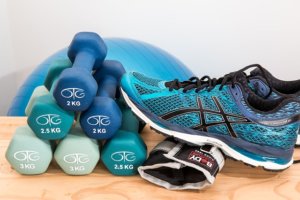The link between productivity and good health has long been recognised. In fact, the World Health Organisation (WHO) believe in the promotion and maintenance of the highest degree of physical, mental and social wellbeing of workers in all areas and state that adequate nourishment can raise national productivity levels by 20 % (WHO, 2003a)…. Some careers, like the military, obviously require a certain level of physical fitness. Yet, good health, nutrition and exercise levels are needed for a healthy mind, as well as a healthy body. Poor nutrition and little exercise can seriously reduce your ability to concentrate, stay focused and deliver your best. Even (or especially) if you spend most of your day behind a desk, these nutrition and lifestyle tips will help you stay healthy and become more productive.
1. NEVER SKIP BREAKFAST
 As your rush to start your working day and navigate your commute, it can be easy to skip breakfast. Yet, this can have a huge impact on your brain’s ability to focus and function at maximum efficiency.
As your rush to start your working day and navigate your commute, it can be easy to skip breakfast. Yet, this can have a huge impact on your brain’s ability to focus and function at maximum efficiency.
After fasting all night, breakfast fuels your body so that you start the day with energy. Your brain and body need glucose in order to function effectively. Without it your body will go into conservation mode with your brain slowing everything down to preserve energy.
You can obtain glucose from eating healthy, slow energy releasing, carbohydrates such as oats and whole grains.
The brain consumes an immense amount of energy relative to the rest of the body and requires complex carbohydrates to maintain memory and concentration levels.
You wouldn’t run your car on no fuel. Don’t run your brain on no food. Give your brain the carbohydrates it needs with a healthy breakfast, to ensure you make the most of your day.
2. EAT SMALL FREQUENT MEALS
 If you have managed to fit in a healthy nutritious breakfast to start your day, don’t undo the good work by either eating nothing until lunchtime or worse still, snacking on high sugar foods to boost your flagging energy levels.
If you have managed to fit in a healthy nutritious breakfast to start your day, don’t undo the good work by either eating nothing until lunchtime or worse still, snacking on high sugar foods to boost your flagging energy levels.
It is easy when you are busy to forget that your body needs top up fuel throughout the day to maintain energy levels and keep your concentration levels high.
Aim to eat every 3-4 hours, choosing healthy snacks such as low sugar flapjacks, nuts, fruit, plain yogurt and seeds. Avoid sugary snacks and drinks which will quickly and temporarily raise your glucose levels before dropping them and lowering your energy, resulting in you feeling tired and lacking focus.
To make things easy for yourself, be prepared and keep a supply of healthy snacks at your office to keep your blood sugar levels balanced for a productive day. If you’re looking to make something for you and your team these cacoa and raspberry peanut butter energy balls are a great option:
3. KEEP YOUR LUNCH LIGHT
 Keeping in mind that you should eat every 3-4 hours, try your best not to over indulge at lunchtime. Energy is required to digest food and if there is a lot of food to digest, you can become sleepy and lacking in concentration whilst your body is working hard on this task.
Keeping in mind that you should eat every 3-4 hours, try your best not to over indulge at lunchtime. Energy is required to digest food and if there is a lot of food to digest, you can become sleepy and lacking in concentration whilst your body is working hard on this task.
Aim to eat a moderately sized meal containing complex carbohydrates, protein, and plenty of different coloured vegetables/salad. Also include a portion of good fats such as oily fish, nuts, seeds and eggs.
The combination of these nutrients will provide enough slow releasing energy to keep your body functioning for optimum productivity.
Avoid processed foods which contain lots of sugar, salt and hydrogenated fats, as these will not provide enough fuel for your brain and may reduce its function. The Eatwell Guide from the NHS provides some helpful guidance on this.
If you eat right at lunch, you’ll find you will then return to work alert, focused and ready for any challenges the afternoon may bring.
4. ENSURE YOUR DIET CONTAINS PLENTY OF OMEGA 3
 Omega 3 fatty acids are a good fat. They are used for various functions throughout the body including boosting brain function and volume.
Omega 3 fatty acids are a good fat. They are used for various functions throughout the body including boosting brain function and volume.
The brain contains 100 billion cells and omega 3 fatty acids are the building blocks of these cells. It is thought that the higher the level of omega 3 in the brain cell membrane, the better the brain cells are at communicating with other cells, which is an important process for brain function.
To help you remain focused throughout your working week, aim to eat at least 2 portions of oily fish per week and include a variety of nuts, seeds, green leafy vegetables and soya products in your diet.
Look after your brain and it will help look after you.
5. KEEP HYDRATED – DRINK WATER
 Water is vital for all forms of life.
Water is vital for all forms of life.
Just as a plant will wilt without water, our bodies’ systems require plenty of water to perform at their optimum level.
Drinking water helps maintain the balance of bodily fluids. Your body is composed of about 60% water. The functions of these bodily fluids include digestion, absorption, circulation, transportation of nutrients, and maintenance of body temperature.
Mild dehydration (i.e. fluid loss of just 1-3%) can impair energy levels and mood, and lead to major reductions in memory and brain performance. Losing as little as 2% of your body’s water content can significantly impair physical performance.
If you want to stay mentally and physically alert throughout the day keep a large reusable water bottle on your desk and sip from it as you work. In all, you should aim to consume approx 2 litres each day.
6. EXERCISE AND ENERGISE!
 Exercise is vital to keeping your body healthy. It increases fitness and stamina levels keeping your body strong and in good working order.
Exercise is vital to keeping your body healthy. It increases fitness and stamina levels keeping your body strong and in good working order.
Just like ensuring that you give your body the fuel it needs to function, you need to maintain its strength to perform well on a daily basis.
Moderate daily exercise releases endorphins (a feel good chemical in your brain) which improves mental health and makes you more likely to engage in and enjoy your work.
Try low impact exercises such as brisk walking or swimming.
Exercising regularly not only improves your physical and mental health but also boots your immune system.
So not only do you feel more energised, you are also less likely to get ill and have to take days off work.
Regular exercise is also linked to higher self esteem, better sleep and less stress.
If you are desk bound and struggle to find time for exercise, try a few simple things such as parking your car further from your office or getting off the bus a stop earlier to walk the extra distance.
Use stairs, instead of lifts, and stand to make phone calls.
Or perhaps try some of these exercises that you can do at your desk (if your colleagues look at you in a strange way – get them to join in!):
7. INCREASE YOUR FIBRE INTAKE
 The current recommendation is that adults should eat 30g of fibre a day, but our average intake is around 20g a day
The current recommendation is that adults should eat 30g of fibre a day, but our average intake is around 20g a day
Fibre is an important nutritional tool to help the body digest food slowly and steadily, keeping energy levels stabilised. It helps to move toxins through your digestive system more quickly, preventing you from feeling sluggish and helping to keep you alert.
It is a bulking agent, which makes you feel fuller for longer, keeping you away from the temptation of reaching for unhealthy sugary snacks which can unbalance your blood sugar levels.
Eat plenty of fibre rich foods such as fruit, vegetables and wholegrains.
8. EAT YOUR ‘5 A DAY’ OR MORE!
 ‘EAT A RAINBOW’ every day. Make sure that you eat plenty of different coloured fruit and veg every day, aiming for a minimum of 5 portions or ideally 10. Fruit and vegetables are antioxidants which scientists believe may play a part in preventing diseases such as cancer, diabetes and heart disease.
‘EAT A RAINBOW’ every day. Make sure that you eat plenty of different coloured fruit and veg every day, aiming for a minimum of 5 portions or ideally 10. Fruit and vegetables are antioxidants which scientists believe may play a part in preventing diseases such as cancer, diabetes and heart disease.
They are also packed full of vital vitamins and minerals to help support the immune system and also protect the brain from damage.
If you have started to fuel your body with the right types of carbohydrate, protein and fat, you now need to give your body the nutrient boost it needs to stay fit and healthy.
9. KEEP ALCOHOL INTAKE TO A MINIMUM
 Lots of us like the odd glass of wine or have a favourite tipple, but do bear in mind that alcohol can chemically alter the functions of your brain, increasing the chances of making incorrect or unreliable decisions. It can also slow your reactions leading to mistakes.
Lots of us like the odd glass of wine or have a favourite tipple, but do bear in mind that alcohol can chemically alter the functions of your brain, increasing the chances of making incorrect or unreliable decisions. It can also slow your reactions leading to mistakes.
Think about this before you drink alcohol during your lunch break, as it will have a detrimental effect on your performance during the afternoon.
The other major issue, is that alcohol is a stimulant and affects the quality of your sleep, making you tired and irritable upon waking. After several sleepless nights, the mental effects become more serious. Your brain will fog, making it difficult to concentrate and make decisions.
Which leads us nicely to number 10:
10. GET A GOOD NIGHT’S SLEEP
 As already mentioned in tip 9, a good night’s sleep is vital for your body to work at its optimum levels. The benefits of sleep are well documented. This is the time for your body to repair and rejuvenate.
As already mentioned in tip 9, a good night’s sleep is vital for your body to work at its optimum levels. The benefits of sleep are well documented. This is the time for your body to repair and rejuvenate.
You wouldn’t expect your body to perform with no food, so make sure you let your body rest and re-energise.
A good night’s sleep of between 6 to 8 hours will improve mental health and increase both physical and academic performance. Some scientists believe that this tip maybe one of the most important areas to focus on and if you want to find out more information, take a look at this insightful and interesting talk on why we sleep –
Find out more about how lack of sleep can affect your body at:
11. LIMIT STRESS
 Whilst a level of stress is often inevitable in today’s world, it is important to manage your stress levels.
Whilst a level of stress is often inevitable in today’s world, it is important to manage your stress levels.
Of course, we need a certain amount of stress to achieve success. Mild stress acts as a useful motivator, inspiring greater activity and productivity.
Yet, too much stress can generate many symptoms, such as changes in immune function, hormonal responses and biochemical reactions, which can influence and negatively impact upon the body’s functions. This can result in persistent headaches, backache, digestive issues and recurrent infections. These will affect your concentration and productivity and may even result in absence from work.
Studies show that the digestive tract is the most easily influenced by stress leading to indigestion, heartburn, gastritis and ulcer problems.
To avoid encountering digestive problems, whilst in the office, try to eat away from your desk and work, allowing yourself plenty of time to eat your lunch in a peaceful setting. Stress experienced around the time of eating diverts the necessary energy required for efficient digestion and can lead to indigestion and heartburn.
In general, it is good practice to get away from your workload and take 30- 60 minutes per day to eat lunch, relax and get some fresh air.
12. LEARN SOME RELAXATION EXERCISES
 As outlined above, whilst a bit of stress can help keep you motivated, staying relaxed at work is important for success. If you face a high pressure situation, like a big pitch or presentation for instance, it can be helpful to have a relaxation exercise ready to go
As outlined above, whilst a bit of stress can help keep you motivated, staying relaxed at work is important for success. If you face a high pressure situation, like a big pitch or presentation for instance, it can be helpful to have a relaxation exercise ready to go
Relaxation exercises help to reduce stress levels by calming the mind and learning to experience moments of inner peace. Try to empty your mind of all the negative thoughts and take time out to refocus and rejuvenate.
Try a deep breathing exercise to help you feel calmer, such as the ‘4-7-8 Breathing technique’ described below…
- Exhale completely through your mouth, making a whoosh sound.
- Close your mouth and inhale quietly through your nose to a mental count of four.
- Hold your breath for a count of seven.
- Exhale completely through your mouth, making a whoosh sound to a count of eight.
- This is one breath.
Or you might prefer an exercise which combines breathing and visualisation, such as the simple visualisation exercise recommended on the nhs website:
13. HAVE FUN
 ‘All work and no play, makes Jack a dull boy’
‘All work and no play, makes Jack a dull boy’
Many of us will be familiar with this proverb, but have you ever stopped to think what it might mean?
Whilst work is an important part of life, which gives us structure, routine, personal fulfillment, social interaction, and of course, pays the bills, we also need to do things we enjoy and that help us to unwind and relax.
To ensure that you enjoy your working life and are able to fully engage, it is important to have a work/life balance.
Maintaining this balance is also important for your personal health and relationships, which will, in turn, increase your self-esteem and improve the efficiency of your work.
Make sure you make time for yourself, to do the things you enjoy.

Rebecca Larkin
Bigrock would like to thank Rebecca Larkin for researching and authoring this post. In addition to her role as Company Secretary at Bigrock, Rebecca has recently completed her studies in personal nutrition, gaining her Crossfields Institute Level 4 Diploma in Nutrition and Lifestyle Coaching. In this post, Rebecca combines the knowledge gained during her studies, with her own experiences in supporting busy professionals (as both a wife and mother).
